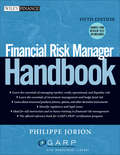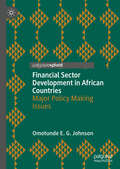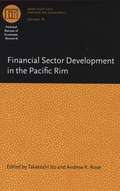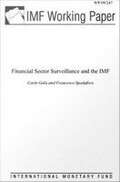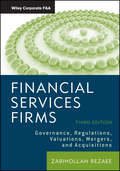- Table View
- List View
Financial Risk Management in Banking: Evidence from Asia Pacific (Banking, Money and International Finance #17)
by Shahsuzan Zakaria Sardar IslamAs risk-taking is an essential part of the banking industry, banks must practise efficient risk management to ensure survival in uncertain financial climates. Banking operations are specifically affected by fluctuations in interest rates which cause financial imbalance; thus banks are now required to put in place an effective management structure that incorporates risk management efficiency measures that help mitigate the wide range of risks they face. In this book, the authors have developed a new modelling approach to determine banks’ financial risk management by offering detailed insights into the integrated approach of dollar-offset ratio and Data Envelopment Analysis (DEA), based on derivatives usage. It further analyses the efficiency measurement under stochastic DEA approaches, namely (i) Bootstrap DEA (BDEA), (ii) Sensitivity Analysis and (iii) Chance-Constrained DEA (CCDEA). As demonstrated in the modelling exercise, this integrated approach can be applied to other cases that require risk management efficiency measurement strategies. Additionally, this is the first book to comprehensively review the derivative markets of both the developed and developing countries in the Asia-Pacific region, by examining the differences of risk management efficiency of the banking institutions in these countries. Based on this measurement approach, strategies are provided for banks to improve their strategic risk management practices, as well as to reduce the impacts from external risks, such as changes in interest rates and exchange rates. Furthermore, this book will help banks to keep abreast of recent developments in the field of efficiency studies in management accounting, specifically in relation to hedge accounting, used by banks in the Asia-Pacific region.
Financial Risk Manager Handbook
by Philippe JorionThe essential reference for financial risk management Filled with in-depth insights and practical advice, the Financial Risk Manager Handbook is the core text for risk management training programs worldwide. Presented in a clear and consistent fashion, this completely updated Fifth Edition-which comes with an interactive CD-ROM containing hundreds of multiple-choice questions from previous FRM exams-is one of the best ways to prepare for the Financial Risk Manager (FRM) exam. Financial Risk Manager Handbook, Fifth Edition supports candidates studying for the Global Association of Risk Professional's (GARP) annual FRM exam and prepares you to assess and control risk in today's rapidly changing financial world. Authored by renowned risk management expert Philippe Jorion-with the full support of GARP-this definitive guide summarizes the core body of knowledge for financial risk managers. Offers valuable insights on managing market, credit, operational, and liquidity risk Examines the importance of structured products, futures, options, and other derivative instruments Identifies regulatory and legal issues Addresses investment management and hedge fund risk Financial Risk Manager Handbook is the most comprehensive guide on this subject, and will help you stay current on best practices in this evolving field. The FRM Handbook is the official reference book for GARP's FRM® certification program. Note: CD-ROM/DVD and other supplementary materials are not included as part of eBook file.
Financial Risk Manager Handbook: FRM Part I / Part II (Wiley Finance #625)
by Philippe Jorion GARP (Global Association of Risk Professionals)The essential reference for financial risk management Filled with in-depth insights and practical advice, the Financial Risk Manager Handbook is the core text for risk management training programs worldwide. Presented in a clear and consistent fashion, this completely updated Sixth Edition, mirrors recent updates to the new two-level Financial Risk Manager (FRM) exam, and is fully supported by GARP as the trusted way to prepare for the rigorous and renowned FRM certification. This valuable new edition includes an exclusive collection of interactive multiple-choice questions from recent FRM exams. Financial Risk Manager Handbook, Sixth Edition supports candidates studying for the Global Association of Risk Professional's (GARP) annual FRM exam and prepares you to assess and control risk in today's rapidly changing financial world. Authored by renowned risk management expert Philippe Jorion, with the full support of GARP, this definitive guide summarizes the core body of knowledge for financial risk managers. Offers valuable insights on managing market, credit, operational, and liquidity risk Examines the importance of structured products, futures, options, and other derivative instruments Contains new material on extreme value theory, techniques in operational risk management, and corporate risk management Financial Risk Manager Handbook is the most comprehensive guide on this subject, and will help you stay current on best practices in this evolving field. The FRM Handbook is the official reference book for GARP's FRM certification program.
Financial Risks, Stability, and Globalization
by Omotunde E.G JohnsonThis book contains the proceedings of the IMF's eighth Central Banking Seminar held in the US in June 2000. These seminars have been organised every two to three years to provide a discussion forum for IMF members, and this publication focuses on the stability of the international financial institutions and risk management issues.
Financial Sector Assessment
by International Monetary FundA report from the International Monetary Fund.
Financial Sector Assessment Program
by International Monetary FundA report from the International Monetary Fund.
Financial Sector Crisis and Restructuring Lessons from Asia
by Charles Enoch Carl Johan Lindgren Leslie TeoA report from the International Monetary Fund.
Financial Sector Development in African Countries: Major Policy Making Issues
by Omotunde E. JohnsonThis Palgrave Pivot begins with a broad focus on financial sector development as a whole, highlighting areas such as the money market, payment system, and the capital market, as well as issues such as regulatory strategy, capacity building of financial firms and service providers, and financial inclusion. In the area of foreign exchange market policies, the book argues that African countries should aim for social efficiency of the markets, which would include soundness of their foreign exchange systems, from an economic growth perspective, and fairness from an income distributional perspective. Finally, in recognition of the fact that some African countries desire financial systems that are strong enough to be international centers of finance, the policy-making implications of that ambition are discussed. This book will be of interest to scholars and students in development economics, finance, and money and banking, as well as policy-makers and practitioners. Further, international organisations and independent research organisations interested in economic development in general or financial system development issues will also find this book of value.
Financial Sector Development in Ghana: Exploring Bank Stability, Financing Models, and Development Challenges for Sustainable Financial Markets (Palgrave Macmillan Studies in Banking and Financial Institutions)
by Thankom Arun James Atta Peprah Evelyn Derera Harold NgalawaThis book investigates factors that contribute to the development of an efficient financial sector in Ghana. While sustainable finance has long been known to propel economic growth and development, and while many African countries have taken initiatives to develop integrated frameworks of their financial sectors that tackle developmental challenges, scholars and policymakers have always grappled with understanding of factors that enhance performance of the financial sector. In this book, an expert team of authors examines the financial landscape, central bank policies, competition, financial innovation, financial inclusion and banking stability in Ghana, while also exploring how financing models such as enterprise finance and microfinance can be more effective in sustaining financial markets. The authors discuss how Ghana can build fortified institutions, regulatory frameworks, and productive capacity to strengthen the financial sector and foster pathways that will enhance economic development. Empirical and scientific evidence give this book a unique approach that is both qualitative and quantitative.
Financial Sector Development in Sub-Saharan African Countries
by George Iden Peter C. Hayward Jean-Pierre BriffautA report from the International Monetary Fund.
Financial Sector Development in the Pacific Rim
by Takatoshi Ito Andrew RoseThe reform in Asian financial sectors-- especially in banking and stock markets-- has been remarkable since the currency crisis of 1997-98. East Asia is now a major player in international finance, providing serious competition to the more traditional financial centers of London and New York. Financial Sector Development in the Pacific Rim provides a rich collection of theoretical and empirical analyses of the growing capital markets in the region. Bringing together authors from various East Asian and Pacific nations, this volume examines the institutional factors influencing financial innovation, the consequences of financial development, widespread consolidation occurring through mergers and acquisitions, and the implementation of policy reform. Financial Sector Development in the Pacific Rim offers the comparative analysis necessary to answer broad questions about economic development and the future of Asia.
Financial Sector Reform and the International Integration of China (Routledge Studies on the Chinese Economy)
by Zhongmin WuChina's economy, which continues to grow rapidly, is having an ever greater impact on the rest of the world. This impact is likely to be felt increasingly in the financial sector where China's foreign currency reserves, fuelled by the huge trade surplus, are a very significant factor in world financial markets. This book, based on extensive original research by a range of leading experts, examines many key aspects of current reforms in China's financial sector and China's increasing integration into the international economy. Subjects covered amongst many others include: the derivatives market in China; stock market liberalisation; the internationalization of accounting standards in China; the impact of international foreign direct investment by Chinese firms; and a discussion of the likely long-term economic effects of the Beijing Olympic Games.
Financial Sector Reforms and Exchange Arrangements in Eastern Europe
by Paul R. Masson Eduardo Borensztein Guillermo CalvoA report from the International Monetary Fund.
Financial Sector Surveillance and the IMF
by Carlo Gola Francesco SpadaforaA report from the International Monetary Fund.
Financial Security For Dummies
by Eric TysonBoost your financial health so you’re ready for any economic or personal upheaval Crisis is inevitable—but it doesn’t have to torpedo your finances! Financial Security For Dummies offers proven advice to help you prep your finances for the next economic downturn, personal setback, pandemic, plague of locusts—or anything else life throws your way. This book contains the historical perspective and up-to-date info you’ll need to anticipate, understand, and navigate a wide range of personal financial challenges. If your monthly income and expenses are on steady ground and you’re ready to secure your financial future, this is the For Dummies guide for you. Not only will you create a plan to keep your family’s finances afloat during turbulent times, but you’ll also be liberated from the pressure to “keep up with the Joneses” so you can make smarter financial decisions, starting today. This book will help you: Gain an understanding of how unforeseen personal or global events could affect your financial life Learn strategies for protecting your assets when economic downturns and other emergencies occur Feel confident in your unique path to financial freedom so you can remain calm when life takes an unexpected turn Build a survival plan for protecting yourself with broader safety nets, better money decisions, and improved financial literacy Whether you want to reduce your stress surrounding your financial goals or take advantage of financial opportunities crises create, Financial Security For Dummies will equip you to navigate financial challenges and ultimately achieve peace of mind.
Financial Security and Personal Wealth
by Lewis D. SolomonAmerica's elderly population is soaring, presenting numerous challenges for policymakers in the United States. Other developed nations with aging populations face similar problems. There will be fewer workers relative to retirees in coming decades and the elderly are also expected to live longer. The impact of these demographic changes in the United States is likely to be challenging, especially for America's system of social security. Solomon offers new perspectives on how to meet the future costs of social security without bankrupting the next generation or gravely damaging the U.S. economy. He also shows, more broadly, how to provide for the financial security of America's senior populations.Over the past two decades, primary responsibility for providing a financially adequate retirement has shifted from the federal government and employers to individuals. For most Americans, social security alone will not provide enough income. Most companies have shed their pension plans for 401(k) plans, to which companies and employees contribute, and in which participants must make their own investment decisions. Consequently, achieving financial security in retirement has increasingly become one's personal responsibility.Solomon deals extensively with the politics of social security, past and present. He examines the presidential leadership of Franklin D. Roosevelt and Ronald Reagan, both of whom revived the nation's spirit in times of crisis, both of whom introduced economic policies that remain controversial to the present day. He also considers in detail contemporary efforts to rethink social security, focusing on fundamental reform of the social security system and the expansion and simplification of employer-sponsored retirement plans and individual retirement arrangements.Richly textured, informed, and informative, Financial Security and Personal Wealth encompasses history, demography, political economy, public finance, social policy.
Financial Security in China
by Dexu HeThis book studies typical issues regarding China's financial security, such as internal and external currency security, herd behavior in bank credit, system risk in the stock market, major risks in the insurance industry, risks related to shadow banking, and real-estate finance security. The book reflects the author's longtime research experience and personal thought. It uses a completely new structure to present useful and targeted-based countermeasures and suggestions, making it a valuable reference resource for those involved in solving China's financial security problems and creating China's future financial security system. It is highly recommended for readers who want to understand the current situation and features of China's financial security.
Financial Security in Troubled Times
by Ric EdelmanIn troubled times, it is only natural to worry about our financial security. That's why now is the time to act -- to preserve your financial well-being, and that of your family, and to ensure your peace of mind.Financial expert and best-selling author Ric Edelman has written this guide to help all of us quickly safeguard our economic lives. Edelman's eight-point action plan -- actions that you can take right now -- will help you protect yourself and your family, as well as your money, your income, your job, your home, your possessions, and your business. You'll learn how to manage the powerful emotions that can cloud your financial judgment, and find the guidelines you need to make the right investment decisions now that will secure your investments today and prepare you for the future.And because it is more important than ever that we be generous in our charitable giving, you will learn the best ways to give, so you can lend support to all our neighbors who are in such dire need of our help.Financial Security in Troubled Times will help all of us face the future, knowing that our financial house is in order and that we are ready to meet the challenges ahead.
Financial Serial Killers
by Bruce Kelly Tom AjamieBy using true tales of thieves, swindlers, and fraudsters at work, Financial Serial Killers illustrates how these perpetrators get their hooks into investors' wallets, savings accounts, and portfolios--and never let go. The worst financial crisis since the great depression revealed that thousands of mom and pop investors had lost millions to so-called Mini-Madoffs. They are the thieves and conmen who had used phony financial acumen to steal investors' money, wipe out savings, and damage lives. Financial Serial Killers reveals the cons--from the grand to picayune--advisers cultivate with their victims--relationships that are essential to the fraud. Take the story of Lillian, the little old lady who invested with Warren Buffett, one of the richest men in the world. After her husband died, she thought her family's treasure of $24 million in stock controlled by Buffett was safe. It was--until a family relative introduced the eighty-nine-year-old grandmother to a pair of unscrupulous insurance agents who convinced her to reinvest her savings in life insurance--decimating her nest egg while padding the agents' pockets. Lillian's story, as well as other accounts of deceit and fraud are the core of Financial Serial Killers. Readers will learn how to better protect their family's wealth and savings after reading this book.
Financial Services Anti-Fraud Risk and Control Workbook
by Peter GoldmannMyth-busting guidance for fraud preventionin a practical workbook formatAn excellent primer for developing and implementing an anti-fraud program that works, Financial Services Anti-Fraud Risk and Control Workbook engages readers in an absorbing self-paced learning experience to develop familiarity with the practical aspects of fraud detection and prevention at banks, investment firms, credit unions, insurance companies, and other financial services providers.Whether you are a bank executive, auditor, accountant, senior financial executive, financial services operations manager, loan officer, regulator, or examiner, this invaluable resource provides you with essential coverage of: How fraudsters exploit weaknesses in financial services organizations How fraudsters think and operate The tell-tale signs of different types of internal and external fraud against financial services companies Detecting corruption schemes such as bribery, kickbacks, and conflicts of interest, and the many innovative forms of financial records manipulation Conducting a successful fraud risk assessment Basic fraud detection tools and techniques for financial services companies, auditors, and investigators Fraud prevention lessons from the financial meltdown of 2007-2008Written by a recognized expert in the field of fraud detection and prevention, this effective workbook is filled with interactive exercises, case studies, and chapter quizzes, and shares industry-tested methods for detecting, preventing, and reporting fraud.Discover how to mitigate fraud risks in your organization with the myth-busting techniques and tools in Financial Services Anti-Fraud Risk and Control Workbook.
Financial Services Firms
by Zabihollah RezaeeIndispensable coverage of new federal regulatory reforms and federal financial issuesAn essential guide covering new federal regulatory reforms and federal financial issuesFinancial Institutions, Valuations, Mergers and Acquisitions, Third Edition presents a new regulatory framework for financial institutions in the post-bailout era.Provides valuable guidance to assess risks, measure performance and conduct valuations processes to create shareholder valueCovers the protection of other stakeholders, including customers, regulators, government, and consumersOffers an up-to-date understanding of financial institutions, their challenges, and their opportunities in the post-Sarbanes-Oxley eraOver the past decade, substantial changes have taken place in the structure and range of products and services provided by the financial services industry. Get current coverage of these changes that have transformed both traditional organizations such as banks, thrifts, and insurance companies, as well as securities providers, asset management companies and financial holding companies with the up-to-the-minute coverage found in Financial Institutions, Valuations, Mergers and Acquisitions, Third Edition.
Financial Services Information Systems
by Jessica KeyesThe calculus of IT support for the banking, securities, and insurance industries has changed dramatically and rapidly over the past few years. Consolidation and deregulation are creating opportunities and challenges never before seen. Unheard of just a few years ago, e-commerce has given birth to new infrastructures and departments needed to suppor
Financial Services Law and Compliance in Australia
by Gail PearsonUp until the global credit crisis in 2008, 'Financial Services' was the fastest growing sector of the Australian economy. This growth has had profound implications for individuals, corporations and government. Following extensive review in the last part of the twentieth century, Australia put in place an overarching system for regulating all financial services, replacing a system that was based on separate regulation of products in individual industries. Focusing on the implications of the new system for retail clients - 'financial citizens' - Financial Services Law and Compliance in Australia provides a comprehensive account of the regulatory structure and a detailed analysis of the legislative framework, including discussion of the new regulatory bodies, the new licensing requirements for those wishing to enter the financial services market and the new obligations for those marketing or offering financial services to the public. This is an essential resource for those working in, and advising on, financial services, for students of financial services law, and for anyone needing to understand this new regime in Australia.
Financial Services Management: A Qualitative Approach
by Stewart FalconerSweeping changes have taken place within financial services over the course of the past thirty years in response to a variety of influences, such as changes in customer attitudes, an evolving regulatory environment, innovations in information technology and the intense level of competition within the sector. In addition, the global financial crisis has had a huge impact on the perceptions of stakeholders and on the reputations of organisations operating in financial services. This new textbook introduces management with a focus on concepts, theories and skills particularly suited to the financial services sector. Beginning with an overview of the development of management theories through history, the text then focuses on topical issues such as organizational design, the use of information technology, the development of a marketing orientation, social responsibility, ethics and, the influence of the external business and social environments and organizational development and the management of change. This practical textbook mixes theory with application throughout - employing a variety of case studies and examples to render the topic both accessible and memorable. The result is a resource that will help lecturers teaching management skills and students keen to develop their financial services understanding.
Financial Services Marketing: A Guide to Principles and Practice
by Christine Ennew Nigel Waite Róisín WaiteThis fourth edition of Financial Services Marketing firmly reinforces the book’s role as a leading global educational resource, combining appropriate conceptual principles with practical insights on how financial products and services are marketed in the real world. The authors draw upon their extensive international experience marketing some of the world’s best known financial brands including Lloyds TSB and Barclays. Readers will gain a firm understanding of how financial products and services work within the commercial, social, economic, governmental, regulatory and environmental context in which they operate.This fully updated and revised edition features: A brand-new chapter devoted to environmental, social and corporate governance Revised coverage of the impact of digital advances in all aspects of business models and marketing practice, including how artificial intelligence (AI) and social marketing are changing financial services and customer experience The latest regulatory developments for safeguarding the fair treatment of customers New and improved case studies that showcase best practice from around the world Upgraded Support Material including new teaching aids and references Financial Services Marketing is essential reading for advanced undergraduate and postgraduate students studying Marketing for Financial Services, Marketing Strategy and Consumer Ethics in Finance. It is also suitable for executive students studying for professional qualifications and executive MBAs.

